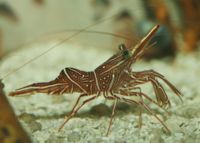Difference between revisions of "Rhynchocinetes durbanensis"
From The Aquarium Wiki
(clean up, replaced: food_flake = 1 → food_flake = Yes, food_live = 1 → food_live = Yes, food_other = 1 → food_other = Yes) |
|||
| Line 30: | Line 30: | ||
|min_sg = 1.020 | |min_sg = 1.020 | ||
|max_sg = 1.025 | |max_sg = 1.025 | ||
| − | |captive_bred = | + | |captive_bred = 1 |
|type = i | |type = i | ||
}} | }} | ||
Latest revision as of 03:43, 14 November 2017
| You can contribute to the Aquarium Wiki by expanding this article. Dont be shy!. |
Camel Shrimp
Rhynchocinetes durbanensis
95 Litres (25 US G.)
3-4 cm (1.2-1.6")
8.2 - 8.4
22.2-25.6°C (72 -78 °F)
8-12 °d
1:1 M:F
3-5 years
This animal is available captive bred
Contents
Alternative names[edit]
- Camel Shrimp, Camelback Shrimp, Hinge-beak Shrimp, Candy Shrimp
Sexing[edit]
- The males of this species tend to have larger claws than the females.
Tank compatibility[edit]
- Not entirely reef-safe, do not keep with zooanthids or other soft corals. Can be a target for aggressive fish or other invertebrates. Prefers to be kept in groups.
Diet[edit]
- Omnivore and scavenger, will pick at soft corals. Will accept brine shrimp, frozen or freeze-dried plankton, and flaked food.
Feeding regime[edit]
- Once a day.
Environment Specifics[edit]
- Prefers to have places to hide. Sensitive to water conditions and copper.
Behaviour[edit]
- Peaceful towards fish and other invertebrates.
Identification[edit]
- Can be mistaken for the Rhynchocinetes uritai or Lysmata wurdemanni. The differences between the two are subtle. The R. durbanensis has bold white lines, a long and toothed rostrum, with 9-10 spines on the upper dorsal end and 16-18 spines on the lower part.
